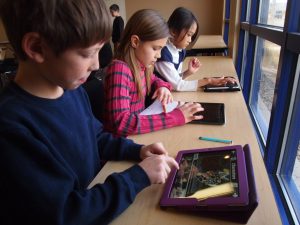As I’ve narrowed down my inquiry question, this week I spent some time looking for some articles to read. I came across the article, Using a handwriting app leads to improvement in manual dexterity in kindergarten children by C. Bulter, R. Pimenta, J. Tommerdahl, C. Fuchs, and P. Caçola (2019).
The researchers questioned if they would see an increase in manual dexterity (MD), letter legibility (LL), number legibility (NL), and word legibility (WL) when students were taught using traditional pen to paper methods 80% of the time while using a handwriting app called ‘Letter School’ for the remaining 20% of their instruction. There was a control group and an experimental group. The control group practiced printing traditionally 5 days a week while the experimental group practiced traditionally 4 days a week and used the iPad, with a stylus, once a week. Both groups were tested before and after the research began.
The researchers discovered that the experimental group “show[ed] significant improvement in MD, while both groups improved handwriting skills with regard to both LL and NL equally” after 12 weeks of the experiment. (C. Butler, et al., p. 7, 2019). MD, as described by the researchers, “is the ability to use manual coordination to grasp and hold objects in fine motor tasks, and is significantly associated with handwriting skills.” (p. 7, 2019).
The researchers also wanted to understand why this app helped to improve MD more than traditional methods. The arrived at three possibilities but did not evaluate them:
- Different tools – pencil verses stylus
- Instantaneous feedback from the app compared to teacher feedback which maybe at the end of instruction
- Overall interest in using technology and/or the apps design features
Some shortcomings from the research are that they did not take into account previous touch-screen skills, they could not randomize the children because of the classroom design, and they used a testing method developed for grade one students on students who were in kindergarten. I also questioned who was doing the teaching. The study involved 9 different classrooms suggesting that 9 different teachers were teaching. How I teach can be different from others as well as my expectations for the end product.
This study was important because, according to Dinehart and Manfra (2013), how a preschool student achieves on tasks related to MD can be related to how they perform on their grade 2 reading and math assessments.
I tested out the free version of this app. I liked that it had three different types of manuscript to choose from. I was most impressed that it included the Handwriting Without Tears (HWT) font which would match my mode of classroom instruction. I would have liked to see the letter sitting on the line so that the children also review where parts of the letters sit. This would be great for moving toward pencil and paper practice. I would perhaps use this app with children that I know are behind or do not have strong fine motor skills before we went to pencil and paper. Did I mention that the app offers practice in 12 languages? Yes, they have an app for our French Immersion teachers too! Don’t fret Grade 3 teachers, LetterSchool also offers a cursive version. Check out my son trialing the free version below.
As my son used the app, you can see how the app immediately corrects him so that he has the correct formation. It doesn’t allow him to start at the bottom and makes him return to the right place before he can move on. After the video was done, he asked to play the app using his finger instead of the stylus. If I was concerned about his fine motor skills, the stylus would be key in building those skills and muscle memory. Overall, he enjoyed the game even though he is in Grade One.
The downside to the free version was that it only provided practice with 5 letters and they weren’t in the same order of the HWT program. As a parent, purchasing this app would be expensive as it is billed annually and not a one-time purchase. However, they do offer schools a significant discount. I will be asking our Learning Support Coordinator for some money to go toward purchasing this app for my classroom iPads.
I’ve concluded that this article reinforces my theme of balance. Further research into what specific amount of time provides the most improvement in MD is needed. I’m a firm believer in using technology to serve a purpose and to use many different tools available to practice necessary skills.
References:
Butler, C., Pimenta, R., Tommerdahl, J., Fuchs, C. T., & Caçola, P. (2019). Using a handwriting app leads to improvement in manual dexterity in kindergarten children. Research in Learning Technology, 27, 1-10. doi:10.25304/rlt.v27.2135
LetterSchool: Learn to Read and Write. https://www.letterschool.org


Recent Comments